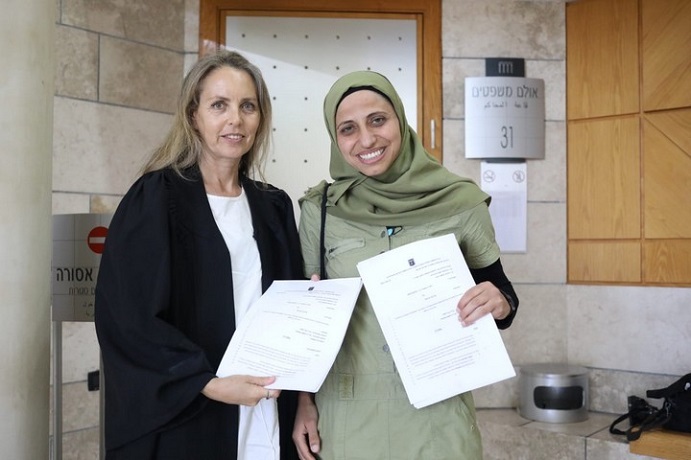
+972 Magazine / July 18, 2019
Palestinian poet Dareen Tatour sat in prison for a poem she published on Facebook. After an Israeli court ruled that the poem does not constitute incitement to violence, the prosecution is now appealing the partial reversal of her conviction.
Israel’s state prosecution is trying to appeal the partial reversal of the conviction of Dareen Tatour, the Palestinian poet found guilty of incitement to violence over a poem she published on Facebook in 2015.
The prosecution submitted a formal request two weeks ago to appeal the decision, which was handed down by the Nazareth District Court in May, to the Supreme Court. The District Court accepted in May that the poem in question, “Resist My People, Resist Them,” published on Tatour’s personal Facebook page, did not constitute incitement despite the discomfort it might cause the public, while also recognizing her as a poet.
Meanwhile, the court let stand her conviction over two other social media posts, which included support for Islamic Jihad, a proscribed group.
Following the prosecution’s submission, Tatour launched an online petition asking the general public for support in the next stage of her legal battle. The petition asks for the public’s signatures “as a sign of popular and societal resistance against oppression and silencing. Do not let it happen that once again the State of Israel accomplishes to criminalize not only myself but Palestinian voices and narratives in general.”
The prosecution submitted its request at the beginning of the month and Tatour’s attorney, Gaby Lasky, has until July 22 to respond, after which the Supreme Court will decide whether to hear the state’s appeal. The prosecution claims that although the poem may not be a “direct call” for violent actions and terrorism, it stills contains an indirect call for violence. The appeal will also challenge the District Court’s recognition of Tatour as a poet.
According to the request, the “complete disregard of the District Court of this possibility is liable to send the wrong message to extremists, who may post incitement online… under the guise of being a ‘poet,’ ‘author,’ ‘journalist,’ ‘singer,’ and/or any other title.”
The prosecution had initially attempted to prove that Tatour is an influential poet and thus her writing could be deemed a danger, although it now claims that Tatour is not a poet at all, and thus the freedom of expression generally extended to artists should not be taken into account in her case.
“I was surprised they submitted an appeal,” said Tatour. “I think it is a question of principle for them: they don’t want a Palestinian woman to ‘defeat’ the state. They want to scare people, so they are returning to the courts.”
Tatour was arrested in October 2015, after which she spent three months in jail before being placed under house arrest for nearly two-and-a-half years. Her house arrest, which began in January 2016, included various restrictions.
At first she was held at her brother’s home who lives in Kiryat Ono, a suburb of Tel Aviv. Only after a legal struggle was she permitted to return to her parents’ home in Reineh, near Nazareth. Her family was forced to disconnect the internet at home and Tatour was forbidden from using a computer. For months, she was forced to wear an ankle monitor.
She was convicted in May 2018 of incitement to terrorism and violence and sentenced to five months in prison. She was released on September 20, 2018.
Although she had already served her time in prison, Tatour was determined to appeal her conviction to the District Court as a matter of principle. The state, it seems, is using the same logic in trying to retroactively prove that her poetry was a form of incitement.
“It’s hard for them to accept that there is a Palestinian woman who still has strength left after this battle,” she said. “They want to continue to oppress me. I sat in courtrooms for three years and I heard that this poem and this poet is dangerous. Suddenly she isn’t so dangerous. For them, it’s a blow.”
Lasky explains that the prosecution cannot change Tatour’s sentence at this point, both because she has already served time in prison and because the state did not appeal her sentence (in order to increase the sentence) when it was originally handed down.
“It is very difficult to understand the distinction that the District Court has made between the lack of a concrete possibility of terrorist actions in the first case (the poem) and in the second and third cases,” wrote the prosecution in their request to appeal, stating that “indirect” incitement, like in the case of Tatour’s poem, is liable to provoke violence.
“It’s a shame that the prosecution would submit an appeal in order to reduce freedom of expression and harm the basic principle of artistic creativity,” said Lasky. “At a time when the education minister is talking about ‘conversion therapy’ and the culture minister is attacking artists whose role it is to raise critical questions, the prosecution is reducing the boundaries of creative freedom instead of defending them.”
“The truth is that I did not think they would try to appeal. I thought it is good for them that there was only a partial reversal — a kind of ‘celebration of Israeli democracy,’ in which a poet is found innocent for writing a poem,” said Tatour. “At the same time, I didn’t allow myself to celebrate after three and a half years of prison and courts.”
Oren Ziv is a photojournalist and a founding member of the Activestills photographers collective. Since 2003 he has been documenting a range of social and political issues in Israel and the occupied Palestinian territories, with an emphasis on activist communities and their struggles.





![vrijdag 17 mei in Amsterdam: in gesprek [videoverbinding] met Palestijnse arts Ghassan Abu-Sittah](https://palestina-komitee.nl/wp-content/uploads/2024/04/abu-Sittha-1-1-218x150.png)






